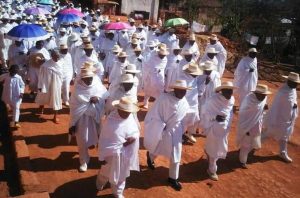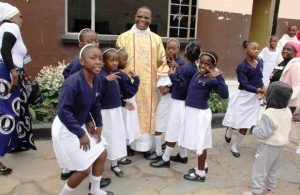Boko Haram militants have released 82 schoolgirls out of a group of more than 247, whom they kidnapped from the northeastern town of Chibok in April 2014 in exchange for prisoners and money.
“We thank God that these girls have re-embraced their families, but I wonder why they had to wait three years for this to happen”, said Cardinal John Olorunfemi Onaiyekan, Archbishop of Abuja, commenting on the release of 82 kidnapped girls.
“In all these years I was among those who insistently asked the government to do everything possible to free the girls. The government replied that it could not negotiate for their release with terrorists, exchanging them with some Boko Haram prisoners. But that is what eventually happened. For their release some Boko Haram leaders were released and an important figure was paid. Why did this not happen before, saving three years of suffering for these girls and their families?” asked the Cardinal.
“Three years of anguish that could be have been avoided – he stresses. Among them is a girl with an amputated leg. If these girls had been the daughters of some powerful leader would they have lost all this time?”, stressed Cardinal Onaiyekan. “We also forget that there are still more than 100 girls whose fate we know nothing about. Some of them probably died during fights, illness or childbirth. At least let families know the fate of these poor girls. I invite everyone to pray for their release”, concluded the Cardinal.
Switzerland and the International Committee of the Red Cross helped secure the 82 girls in “lengthy negotiations”, the presidency said.
President Muhammadu Buhari received the girls on Sunday 7th in the capital, Abuja. The Nigerian government paid Boko Haram a significant amount in foreign currencies, in addition to releasing two of the insurgent group’s detainees.
The kidnapping was one of the most high-profile incidents of Boko Haram’s insurgency in Nigeria’s northeast. About 247 girls were abducted from their school in a night time attack.
More than 20 girls were released last October in a deal brokered by the International Committee of the Red Cross. Others have escaped or been rescued, but 195 were believed to be still in captivity before this release.
Nigeria president Buhari said last month that the government was in talks to secure the release of the remaining captives. The release of the 82 girls may give a boost to the former military ruler who made crushing the Islamist militant Boko Haram insurgency a key pillar of his election campaign in 2015.
He has hardly appeared in public since returning from Britain in March for treatment of an unspecified sickness. Although the Chibok girls are the most high-profile case, Boko Haram has kidnapped thousands of adults and children, many of whose cases have been neglected.
During its seven-year campaign against the Nigerian government, Boko Haram has killed 15,000 people and forced more than 2 million more from their homes. Although the army has retaken much of the territory initially lost to Boko Haram, large parts of the northeast, particularly in Borno state, remain under threat from the militants.






